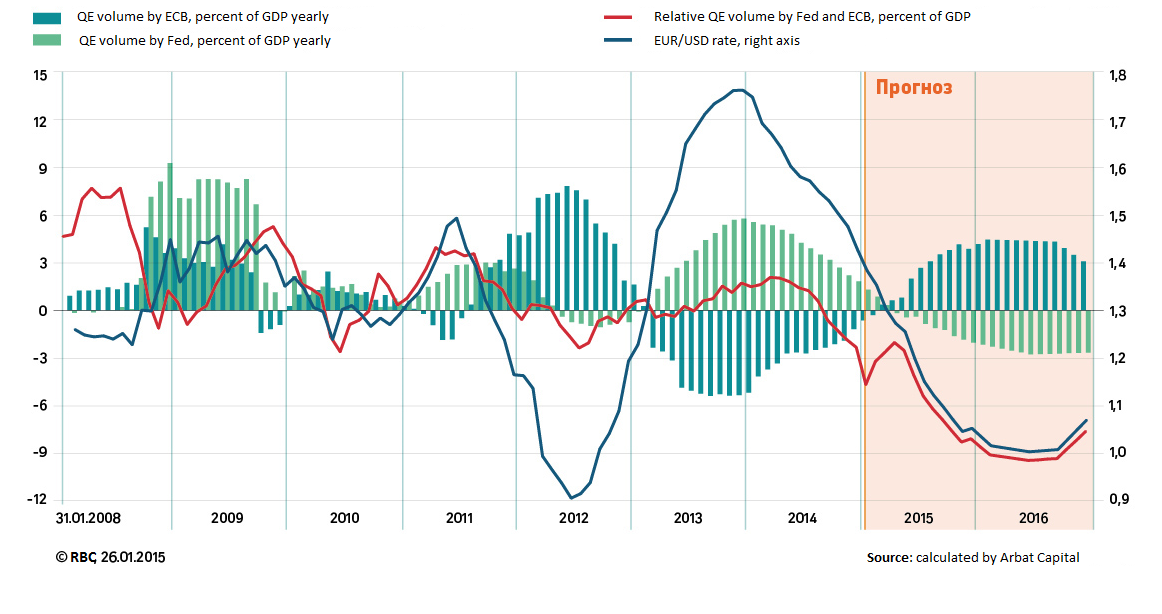The poll of private economists by Reuter’s agency showed they expect ECB to increase the size of quantitative easing in the forthcoming 6 months, which will push the euro down. Now the weak euro is an attractive funding currency, which lets it stay afloat. Shall we expect the euro weakening against the dollar or will the increase of the QE volume cause the short-term euro weakening followed by its further substantial strengthening?
The EUR/USD exchange rate is currently depending mostly on the monetary policy pursued in the US and EU: specifically on the Fed decision on the rates hike and the ECB decision on its quantitative easing program. The first-half US inflation was 1.64% with the target of 2% a year, the current unemployment is close to the full-employment rate and the GDP growth outlook is 2.1%. Thus, the major macroeconomic indicators signal the growing US economy and afford ground for the rates hike. On its September 16-17 meeting the Fed decided to leave the rates unchanged on concerns around the global economic slowdown and particularly in China. Nevertheless, the September showed the Chinese industrial production growth of 0.1% which improved the investors’ confidence and increased the chances of the rate hike by the Fed till the beginning of the next year. In our opinion, the Fed keeps options open until the global growth is stabilized. Previously, the Fed Chair Janet Yellen laid out the US GDP growth being in line with the forecasts as one of the prerequisites for the rate hike.
The alternative view states the US may decide on the 4th round of QE program. Although it is inconsistent with the monetary policy tightening planned by the Fed, the scenario may come true in case the US markets activity decay goes on and if the recent global markets selloff and the Chinese economic slowdown harbinger the new recession. Nevertheless, we consider this scenario unlikely given the strong macroeconomic data from the US.
On the contrary, in eurozone the economic situation does not look that positive. The unemployment rate looks down in most European countries while the GDP growth was revised up from 1.2% to 1.5% year on year. Nevertheless, with almost the same inflation target of close to but below 2 percent its rate in September was 0.1% down provoking the deflationary expectations with the core inflation remaining at 0.9%. Inflation is expected to reach the target no sooner than in 2017. The ECB quantitative easing program is scheduled to conclude next September but there is a view that is may be prolonged due to the decline in inflation despite the monetary economic stimulus and because the ECB, in fact, does not have any other viable alternatives to battle slowdown with the rates close to zero. There is no sense in further rates decrease from the current 0.05% and the EU economy is not ready for the rate hike, so the rates will remain unchanged in the coming days. Moreover, amid the sharp fall in global commodities prices, especially oil, the euro strengthening is unfavorable for the ECB as it pulls the prices down in eurozone. On the other hand, there is much tension in eurozone around the issue of the public debt. It is already several times higher than the EU GDP and the extension or the increase of QE programme would aggravate the imbalance. In our opinion, there is little chance the ECB increases the QE programme, even more so as its economic impact has some lags and its influence on the inflation may appear some time later.
Shall we examine the euro against the dollar exchange rate correlation with the volume of QE programmes held by ECB and the Fed, we will notice the distinct consistency: the euro to dollar exchange rate was on the increase when the volume of the money printed by the Fed was higher than the one of the ECB. Now we are verging the reverse situation. Assuming EBC extends the bond buying programme, the euro rate may really aim for the parity against the US dollar.
Currency wars: ECB vs. Fed

We believe that given the current macroeconomic situation in the US and EU the most likely scenario is the rates hike in the US which will strengthen the dollar, and the ECB decision to leave the QE programme unchanged. The US rate hike will put downward pressure on the euro, which will support the European economy. Consequently, in the coming 6 month the EUR/USD is likely to weaken and even come close to the parity rate.
